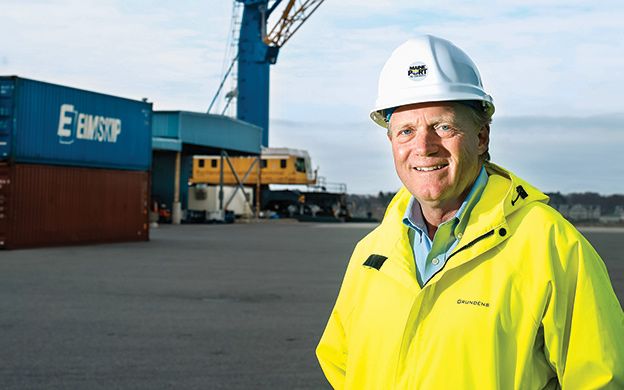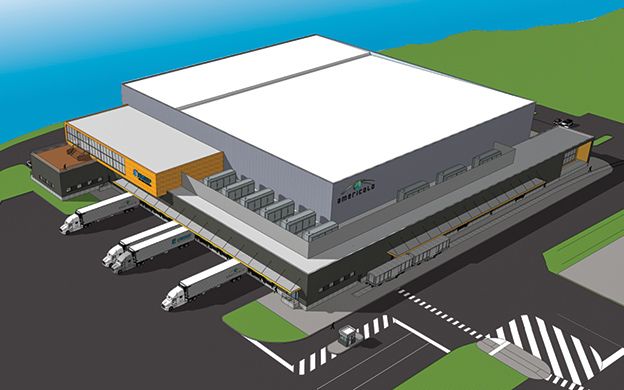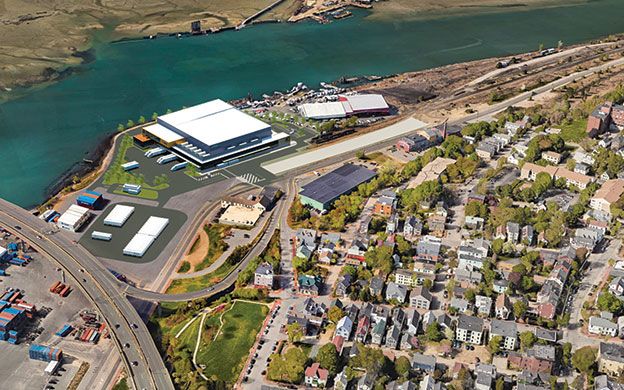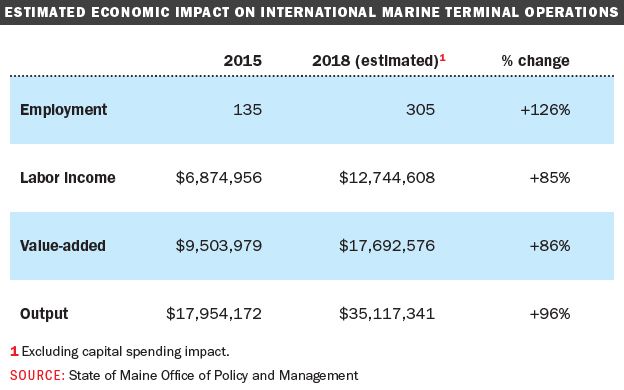It's getting to be 'crunch time' for cold storage facility in Portland
It's crunch time for cold storage. Portland's debate over a proposed multimillion-dollar refrigerated waterfront warehouse is about to heat up, two and a half years after Americold Logistics LLC won the bid to design and build it. The facility is proposed for 6.3 acres leased from the Maine Port Authority at the International Marine Terminal, next to the rail line and close to Interstate 295.
Eimskip USA, the Icelandic firm that brought container shipping back to Portland in 2013, would be the anchor tenant. Supporters see the facility as a way to keep Eimskip here while giving Portland an edge over larger, more crowded ports and supporting food and drinks industries, not just seafood but also agricultural products like blueberries and potatoes.
“The opportunity is bigger than simply giving Eimskip's customers a place to store their product,” says John Henshaw, executive director of the Maine Port Authority. “That's an important component, but there are opportunities to grow the food and beverage industry in the greater Portland area that will be realized because there's a cold storage facility here.”
As the debate continues, Eimskip is considering its options.
“We don't have a plan B,” says Larus Isfeld, managing director of Eimskip USA. “It will definitely affect our plans of moving forward, how we do business in the future, if we cannot get our customers into a cold storage facility somewhere in this area.”
Whether Eimskip really would leave remains to be seen as the cold-storage drama enters the next act.
The fight over height
The public debate over zoning is set to shift into a higher gear with an Eggs & Issues discussion hosted by the Portland Regional Chamber of Commerce on May 10; a Waterfront Alliance open house and panel discussion on May 16; and a public workshop before the Portland Planning Board on May 18.
The main bone of contention is whether the city should waive its 45-foot height restriction in the Waterfront Port Development Zone.
Atlanta-based Americold, the world's largest cold-storage company that runs a 65-year-old facility on Read Street in Portland, has pledged to invest up to $30 million in a 65-foot-tall waterfront structure.
But it still needs to convince the planning board, which wants more information before giving a recommendation to the City Council, and nearby residents like Anne Pringle, president of the Western Promenade Neighborhood Association and a former Portland City Council member representing the Western Waterfront.
“We want to see it demonstrated: What is the size of the building that Eimskip needs to fill its projected volume over a reasonable planning horizon of 10 to 20 years?” Pringle says. She also says it's too “simplistic” to characterize critics as people who want to safeguard their views, which would be similarly impaired by a 45-foot-tall edifice. “I personally observed a bunch of contentious development projects,” she says. “If somebody comes in and asserts they have a need, the city should make them prove it.”
Other opponents argue that truck traffic would significantly increase, property values would drop and that only a small percentage of products being shipped out of the International Marine Terminal would benefit economically from on-site cold storage.
In response, supporters point to evidence including a study by Portland engineering firm Woodard & Curran, which found that Eimskip's shipping volumes are growing so fast that a warehouse limited to 45 feet would exceed capacity by 2023. A separate study by the same firm found that a taller warehouse would give enough scale to offer rates that are competitive with facilities in Massachusetts.
The main draw of the proposed facility would be its waterfront location, the last part of a wider plan to build up Portland's multi-modal cargo-hub status. It would also help local fish-processing companies who are importing more frozen seafood via Eimskip after the New England groundfishing industry's collapse.
One example is Bristol Seafood, which sells Norwegian line-caught haddock shipped by Eimskip and flash-frozen within four hours of being caught.
“It's really the freshest fish you can get,” says Peter Handy, the company's president and CEO. “That's one of the reasons why having a cold-storage facility here locally is important to us.”
Currently, fish that comes in to Portland is hauled to Americold's site at 165 Read St., sometimes up to 20 truckloads six miles there and back. With a freezer on the waterfront, the product could be unloaded at dockside, avoiding traffic congestion on Commercial Street. A new facility would also allow Bristol to bring fish from Asia and Alaska by rail directly to Portland instead of having to go to Boston, which it does now. “If we can have those rail cars come all the way to Portland, that's where we'll see the most savings,” Handy says.
Calendar Islands Maine Lobster Co., which exports processed frozen lobster to Europe and Asia, is just as eager for a new facility.
“I'm a great fan of this cold storage, and the efforts that have been put into making this a success,” says Emily Lane, the company's vice president for sales. “Currently we have to pay a trucking company to take the container to the cold storage facility [on Read Street], load the container, and then take it back to the yard. It would be so seamless to be able to move the container next door, fill the container and off it goes.”
Before Eimskip, the company had to ship lobsters overseas by air from Boston, at average rate of $4.40 a pound to Europe, compared to $1.50 a pound now by sea. “I'm just hoping that cooler heads prevail and that this whole initiative can be moved along,” she says.
Bristol Seafood's Handy is optimistic it will: “One of the things that's special about Portland, is that it's always done a good job balancing the fishing community and the industrial community with having a vibrant arts community, terrific bars and restaurants and outdoor space. I'm confident that historical track record will persist and help this project to move forward.”
Seeing the bigger picture
Americold and Eimskip both have much to gain. In 2015, when it won the bid, Americold president and COO Fred Boehler, who became CEO in 2016, praised “the opportunity to add a brand new, state-of-the-art showpiece building to the area and be part of the future of the port of Portland.” As the public debate plays out, the company declined to be interviewed for this article.
Eimskip, which moved its U.S. headquarters from Norfolk, Va., to Portland, in 2013, is just the opposite. Its publicly traded parent, which is based in Reykjavik, posted record sales in 2016 and is growing by acquisition. Most recently it acquired 51% of CSI Group LLC, a Boston-based company that leases and trades used containers and shipping related assets.
Eimskip has had success in Portland, where it is increasing annual port calls this year from 31 to 36. Though it still has operations in Norfolk, it would re-locate to the new facility if it is built. It has, in fact, already started moving employees to Portland, where 17 people “are more or less sitting on top of each other,” Isfeld says.
As part of a new information campaign to win over public sentiment, the Maine Port Authority launched a website (www.foodeconomymaine.com) in April with information, testimonials and graphics touting the benefits of a freezer warehouse to the port and to Maine's growing food and beverage industries. That includes blueberry and potato growers throughout the state who ship elsewhere in the country or internationally and frequently scramble for freezer space on the East Coast and Canada. “In a world where just about everything we grow somebody else grows too, you need to be finding ways to be competitive,” says Walter Whitcomb, Maine's agriculture commissioner. That's especially true with blueberries, which have a short, three-week growing season and often compete for freezer space with cranberries in Massachusetts. “We're hoping Portland sees itself as important in the natural resources sector,” he says. “It's always trying to view itself as a hub of commerce for the state of Maine, and food is part of that.”
Janine Bisaillon-Cary, president of the Maine International Trade Center and the state's director of international trade, sees cold-storage as a “game-changer” for the food sector, including joint-venture investment opportunities for value-added, innovative agricultural products like new varieties of broccoli and root vegetables. “Cold storage can play a big role not just for greater Portland,” she says, “but for the whole state, particularly rural Maine.”
















Comments